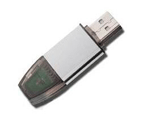Free webinar: Thursday, August 5, 2010 2:00 PM - 2:45 PM EDT
During this webinar, industry veteran Brad Jarvis of HID Global will explore the current and future industry requirements and challenges facing the physical and logical access control (PACs) market. The discussion is based on the Avisian, Inc. 2010 PACs market research study and provides revealing insights on next-generation physical access control systems along with the market drivers behind these trends.
This session will also provide beneficial tips on leveraging secure identity solutions to address rising security challenges, the growing need for higher levels of convenience, and customer demands for reducing the lower total cost of ownership.
Presenters:
Brad Jarvis, vice president of product marketing at HID Global
Chris Corum, editor and publisher at AVISIAN Inc.
With a down economy and the cost of tuition soaring at four-year institutions, community colleges are getting the nod from more and more students. And these colleges are looking to do more through the student ID card, says Jay Summerall, president and founder of CardSmith.
“In the past year or so we have seen more (community colleges) saying that they want to do more with their ID cards,” Summerall says. “They’re wanting to be more in line with what traditional campuses offer.”
CardSmith deployed its first community college system a couple of years ago, but it was at a two-year institution that had resident halls and other amenities that made it more like a traditional four-year school. Since then, however, the company has seen more requests from other types of community colleges.
The interest tends to start with print and copy applications in the library but then goes beyond that to the bookstore and even dining facilities, Summerall says. There may even be a financial aid aspect to the card.
To address the growing interest from community colleges, CardSmith developed a solution that enables a campus card system to be deployed in less than six weeks, Summerall says. The FastStart program is designed to make it easy for community colleges to deploy and add services to student IDs.
Many community colleges already have a card production system, but they don’t have a campus card system to enable applications on the card, Summerall says. “It’s new territory for them.”
To get FastStart going all CardSmith needs is a contact in the business or IT office, Summerall says. Depending on the systems and applications the community college wants to deploy, CardSmith may not even have to send out a technician as installation can be done remotely and training done via the Web and conference calls.
Even if new hardware needs to be installed the system can be deployed quickly, Summerall says. Community colleges traditionally have fewer vending machines and point-of-sale devices than four-year institutions.
CardSmith is waiving its set-up fee for community colleges and enabling the schools to roll the cost of new hardware into a semi-annual fee, Summerall says. The company is also offering a fixed-price guarantee for the first five years the program is in place. “We’re trying to help two-year schools go ahead and launch programs,” he says.
Pioneering FSUCard embarks on next chapter selecting new bank and electronic financial aid delivery partner
 Florida State University and its FSUCard program are credited with helping to pioneer campus card banking partnerships. The university inked its first deal twenty-years ago and have been evolving the ID-bank relationship ever since. This spring the campus is going through the process of selecting a bank partner for the next evolution of the program. It seems an ideal time and an ideal program for a profile of what such a relationship can yield.
Florida State University and its FSUCard program are credited with helping to pioneer campus card banking partnerships. The university inked its first deal twenty-years ago and have been evolving the ID-bank relationship ever since. This spring the campus is going through the process of selecting a bank partner for the next evolution of the program. It seems an ideal time and an ideal program for a profile of what such a relationship can yield.
The Tallahassee, Fla.-based institution enrolled 40,225 students in 2009. There are currently almost 50,000 active FSUCards and a staggering 27,000 cards are produced each year for newcomers and replacements. According to FSUCard Program Director, Richard Wynn, about 14,000 of these cards are for first-time FSUCard holders and an estimated 8,500 of those typically opt for the bank account offering.
For virtually every active FSUCard there is an account with the program’s long-standing bank partner SunTrust. In 2009 there were 43,500 active SunTrust accounts associated with FSUCards.
It is undeniable that the FSUCard has demonstrated that a contractual, exclusive relationship with a campus card program can bring account holders to a financial institution. Without this relationship the bank would certainly have won a percentage of FSU student business, but this volume of accounts could never be achieved in a normal competitive landscape.
But have the accounts brought deposits to the bank or are they simply holding accounts that take up space with little utilization? This question has loomed as long as there have been campus card and bank partnerships. Do the accounts bring value, and actual revenue, to the bank or are they, as some have suggested, unprofitable during the college years but valuable if they transition to long-term relationships?
The FSUCard experience suggests that such a relationship can be valuable in and of itself.
In 2009 the monthly average funds on deposit in FSUCard accounts exceeded $34 million dollars. The average individual account balance was $787.
Adding associated products offered to FSUCard holders–such as personal savings accounts, checking accounts, money market accounts and even commercial accounts–the average balance for the comprehensive relationship approaches an average monthly balance of $50 million.
Financial aid delivery has been key in the success of the program. In addition to pioneering the campus card and bank partnership, the FSUCard program was also a pioneer in the electronic disbursement of financial aid. In the mid 1990s, the FSU began evaluating methods to ease the cumbersome process of issuing checks to students for net financial aid proceeds.
Other early innovators had enabled delivery to bank accounts but FSU saw benefit in restricting this delivery to a single account provider: the one associated with the FSUCard. This would make it easy to manage because the account would not change if a student switched banks. They would have only two choices: opt for rapid electronic delivery to the FSUCard account or wait in line to receive a paper check days later.
It succeeded in easing the burdens with net check issuance and it improved customer service. But it also created a tremendous peripheral benefit for the institution by driving the number of students signing with the bank partner through the roof and bringing huge influxes of cash into the program at the start of each semester.
In one of the initial financial aid disbursements, $12 million dollars flowed into the accounts overnight. They knew they were on to something.
But would students simply use the FSUCard bank account as a receptacle to get their money more quickly but then withdraw or transfer the balance to their normal bank account? Bank and FSUCard officials prepared for a “run” on the branch and ATMs, but their fears went largely unmet. There was certainly a movement of money to other accounts but the vast majority began to use the FSUCard account.
In the decade and a half since the launch, this trend has continued and the account’s usage has become the norm for students, especially financial aid recipients.
In 2009, 26,000 students received some form of aid in both the spring and fall terms. Additionally, 6,500 receive aid for the summer semesters. Of this aid, 80% was delivered electronically to the FSUCard accounts. In the Spring 2009 semester, the aid distribution to SunTrust accounts exceeded $54 million dollars. For the 2009 school year, it topped $100 million.
What does SunTrust pay for this exclusive access to provide services to the FSUCard?
Each year, 1.2% of the average monthly funds on deposit in the FSUCard accounts is owed to FSU. For 2009, this amount was roughly $410,000. The monthly payments bring about $34,000 in operating funds to the program.
In addition, SunTrust provides an annual marketing contribution of $18,000 to help promote the program.
The bank also pays $2,453 in monthly rent for the 2,900 square feet of prime office space in the center of campus. Utilities are paid by FSU so the total annual amount for space is $29,436.
Finally FSU earns $0.35 for each foreign ATM transaction conducted with an FSUCard.
The future of the program
In June 2010 the next generation FSUCard will hit the street. It will look very different than the current version, and it may or may not have a new bank partner. The submitted proposals are in the hands of the University’s purchasing office and a committee has identified a “shortlist” of providers to participate in verbal presentations via an invitation to negotiate process.
If a new partner is selected, it will not be the first time the FSUCard program made such a swap. SunTrust is the fourth bank partner. It can be done, but not without significant pain. This time around, the level of this pain would undoubtedly be far greater because of the program’s success.
To differing degrees, more than 40,000 members of the University community have grown accustomed to using their SunTrust account. As with any other account, many have set up bill pay, opened other accounts with the institution, taken loans, and built personal relationships with staff. This cannot be undone–practically or legally–with the award of an invitation to negotiate or the issuance of a new piece of plastic.
The relationship between the account holder and SunTrust is independent of FSU. If another bank partner is selected, the reissued FSUCards will have a different bank logo, but the cardholders will still have an active account with SunTrust. If an individual wants to use the FSUCard account or receive electronic financial aid distribution, they will need to open an account with the new bank. Even then, however, they will have an active account with SunTrust.
No one can predict the number of cardholders that would elect not to migrate to the new provider but it is certain that some would stay with SunTrust. Another group would most certainly open the new account to receive the financial aid delivery only to withdraw and move it to their SunTrust account.
On the other hand the FSUCard program will still be strong and viable regardless of the bank selection. It could take years, but through normal student attrition the accounts would almost certainly return to current levels. But how would this decrease in accounts and funds on deposit impact the revenue stream enjoyed by the FSUCard program? No way to know but matching or exceeding current revenues would be a likely requirement to arise during the negotiation.
Goodbye chip, hello second mag stripe?
As mentioned the FSUCard will look very different in the near future. The program is ending what has become the campus card industry’s longest running smart card program. The gold contact chip that first appeared on FSUCards back in 1996 is going away in favor of an online mag stripe-based solution from Blackboard Transact.
Other changes may include a major payment brand on the card for the first time. According to the invitation to negotiate, “the University is considering a Visa or MasterCard branded signature debit card as the FSUCard.” The request asks respondents to describe their process for instant issuance of such a card.
Further the invitation to negotiate suggests that a second mag stripe may be on the horizon. “In order for FSU to continue using their ISO (with the addition of a branded financial account) we believe … dual two-track magnetic stripes will work to solve this problem. One magnetic stripe would be a banking Visa/MasterCard stripe and the other would be a FSU magnetic stripe.”
The Maharashtra state government has announced plans to issue smart cards to university graduates to combat the proliferation of counterfeit degrees, according to dnaindia.com.
Since February of this year, 1,134 cases of counterfeit degrees have come to light in the state, says higher and technical education minister Rajesh Tope.
The smart cards will contain data connecting employers to an online facility provided by the university where the legitimacy of the graduate’s degree can be confirmed.
Tope says that all universities in the state will be directed to adopt this technology.
Read more here.
 With medical officials predicting that the H1N1 flu would hit hard as the flu and cold season came around last winter, college campuses struggled to prepare their students.
With medical officials predicting that the H1N1 flu would hit hard as the flu and cold season came around last winter, college campuses struggled to prepare their students.
When the flu strain hit in the spring 2009 some campuses were forces to quarantine students. At the 35,000 student University of Alberta in Canada administrators were preparing to vaccinate students against H1N1 but wanted a way to make sure that only those in the at risk group received it first, says John Younk, associate director of ancillary operation at the university. The school also wanted to track who received the vaccination.
Younk had heard of a nearby university using Verify, a module of its campus card system from Heartland Payments Systems, to conduct such tasks and looked to implement it for vaccine tracking. Verify enables a campus card office to run an access control point off a laptop. The laptop can be preloaded with a list of eligible student, faculty or staff or it can connect to the database via a wireless network.
Students swipe their card through a reader attached to the laptop and are verified, Younk says. The laptop displays a picture of the student as well as any pertinent information for the attendant to review. The system will also let the attendant know if the student has already been processed. Alberta is using the mag stripe on the card but it could also be used with the HID Prox system that the university has in place.
The university vaccinated 3,700 students over the course of three days and the system was use to authenticate those receiving the medication, Younk says.
The university foresees using Verify in other applications too, such as a recent use to verify students purchase of public transportation passes, Younk says. “The sky is the limit. “This is our foray into portable services for anything that need to be done on campus,” he says.
NC State University is in the process of issuing students an updated campus card, which would minimize the number of cards students need to carry, according to a NC State newspaper.
The AllCampus card will still provide all of the services it did before, including access to AllCampus accounts, Board Bucks and meal plans.
New additions include access to the WolfCopy account and proximity card technology, which will enable administrators to manage access into restricted areas or campus buildings.
The new cards will also include expiration dates, at which point the card will stop working and a new one can be issued, if student has a need for one.
Campus officials added that there is still plenty of room to allow for added technology.
To read more click here.
 Two USB flash drives with approximately 26,000 students’ information stored on them were stolen from a Washoe County School District office during a recent burglary, according to a Washoe news report.
Two USB flash drives with approximately 26,000 students’ information stored on them were stolen from a Washoe County School District office during a recent burglary, according to a Washoe news report.
A spokesman for the school district’s office said from now on the school district will make sure all information on any flash drives is encrypted so it is not accessible if it does end up in the wrong hands.
We recently sat down with Neville Pattinson, vice president of government affairs and business development at Gemalto North America, to discuss some of the concerns surrounding these memory sticks and some of the precautions organizations can take.
To listen to the podcast head over to SecureID News or click here.
To get more on this news story click here.
 An independent Nationally Recognized Testing Laboratory (NRTL) recently evaluated CBORD’s Squadron access control technology and found it to comply with industry electrical and operational safety standards for access control systems.
An independent Nationally Recognized Testing Laboratory (NRTL) recently evaluated CBORD’s Squadron access control technology and found it to comply with industry electrical and operational safety standards for access control systems.
Squadron powers CBORD’s CS Access, an IP-based door access control solution used by colleges and university security systems around the world. The Squadron hardware is listed to UL296 and CSA C22.2 No. 205 in the U.S. and Canada.

